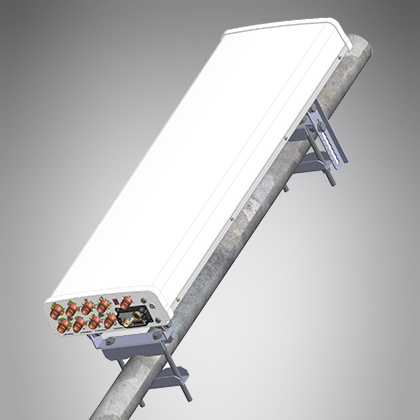Radio Frequency Systems (RFS) has released a new 8-port TDD beamforming antenna for the 3.5 GHz band (3300 to 3800 MHz). The ability to support 3.5 GHz applications is pivotal as operators around the world seek to accommodate growing LTE demand, deploy new small cells and prepare for the rollout of 5G.
The 3.5 GHz band is presently licensed in many countries and under auction in others. Operators in Europe and the Middle East, Asia and South America, for example, are looking to this band to increase LTE network capacity in densely populated urban areas. In the U.S., leading operators are establishing the necessary framework to make the 3.5 GHz band suitable for sharing, to deploy base stations utilizing low and high power small cells. Furthermore, the 3.5 GHz band is poised to be the preferred sub-6 GHz spectrum for the worldwide rollout of 5G networks.
The newest TDD antenna from RFS provides a solution using four columns for flexible use in MIMO beamforming applications in the 3.5 GHz band. Key features include:
- multiple individual beam control (unit beam)
- single, high-powered beam option (broadcast beam)
- beam steering flexibility (service beam)
- integrated, field-replaceable AISG-compliant RET motor
- robust, UV-resistant ASA radome for high long-term heat resistance
- calibration port functionality for precise steering performance
- variable electrical down tilt, from 2 to 10 degrees.
RFS will expand its product portfolio in 2018 with the introduction of an ultra-wideband antenna supporting up to 4.2 GHz. This extension will allow operators to reuse the 4.2 GHz band, currently used for broadband access, for LTE. This next step of RFS’ 3.5 GHz strategy will also help operators overcome the challenge of insufficient installation space, as they transition from 4G to 5G, by integrating the 3.5 GHz beamforming functionality into the legacy multi-broadband antenna supporting low (694 to 960 MHz), mid (1400 to 2400 MHz) and high bands (1695 to 2690 MHz). This will allow the operators to efficiently use the available space on the site towers.
Rani Makke, senior regional product manager for EMEA at RFS, said, “The 3.5 GHz band will play a critical role in the evolution of wireless networks, and RFS is committed to delivering innovative products that will allow our customers to make the most of this frequency band in order to maximize LTE network capacity today and prepare for 5G tomorrow. Our new antenna is the first in a multi-phased roadmap for providing future-proof technologies for 3.5 GHz frequencies.”

